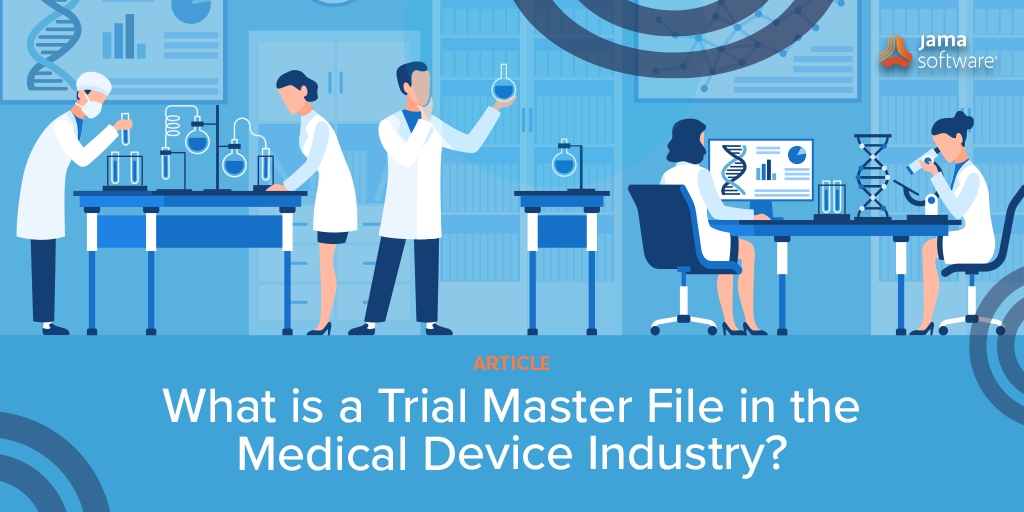What is a Trial Master File in the Medical Device Industry?
A Trial Master File, also known as a TMF, is a collection of records and documentation about the creation, evaluation, and regulatory approval of a medical device. It shows the quality control procedures used in the device’s design, production, and testing to make sure it meets all applicable regulations. Regulators look at the TMF during inspections and audits to see if the device is in compliance.
How is a Clinical Trial Master File (TMF) similar to a Trial Master File?
A Clinical Trial Master File (TMF) is similar to a Trial Master File in that they are both collections of documents and records related to a specific project. However, while a Trial Master File pertains to the development, testing, and regulatory approval of a medical device, a Clinical Trial Master File pertains to the clinical trials conducted to evaluate the safety and efficacy of a medical device, pharmaceutical product, or treatment.
Both types of TMFs provide evidence of the processes and procedures used during the development and testing phases, and both are subject to review by regulatory agencies during inspections and audits.
What is an Electronic Trial Master File?
An Electronic Trial Master File (eTMF) is an electronic version of TMF that stores documents and records generated during the clinical trial process. eTMFs can replace paper-based TMFs and provide a more efficient and effective way to manage the vast amount of information generated during a clinical trial. Using an eTMF is becoming more common in the clinical trial industry due to its many benefits over paper-based TMFs, including improved efficiency, increased security and accessibility, and enhanced regulatory compliance.
To achieve compliance, organizations need defined processes for development and production and detailed traceability, from the high-level user needs through to test management. Documentation is a large part of proving compliance, and Jama Connect® makes it easy to compile the necessary documentation, like eTMFs. By automating the process, teams can focus on what’s important and avoid potential errors.
RELATED: Buyer’s Guide: Selecting a Requirements Management and Traceability Solution for Medical Device & Life Sciences
What types of regulations are TMFs or eTMFs expected to meet?
Both Clinical Trial Master File (TMF) and Electronic Trial Master File (eTMF) must adhere to various regulatory requirements depending on the jurisdiction in which the clinical trial is conducted. Some of the common regulations that a TMF or eTMF must comply with include:
- International Conference on Harmonisation of Technical Requirements for Registration of Pharmaceuticals for Human Use (ICH) guidelines: This is a set of global guidelines for the development, registration, and post-approval of pharmaceuticals.
- Good Clinical Practice (GCP) guidelines: This is an international ethical and scientific quality standard for designing, conducting, recording, and reporting clinical trials that involve the participation of human subjects.
- The Food and Drug Administration (FDA) 21 CFR Part 11: This is a regulation that establishes the criteria under which electronic records and electronic signatures are considered trustworthy, reliable, and equivalent to paper records.
- Health Insurance Portability and Accountability Act (HIPAA): This is a US federal law that requires the protection and confidential handling of personal health information (PHI) stored in electronic form.
- European Union Clinical Trials Regulation (EU CTR): This is a regulation that governs the conduct of clinical trials in the European Union and aims to harmonize the regulatory requirements across EU Member States.
How can a TMF help an organization with successful product development and management?
It is important for the trial sponsor, sponsor’s representative or the CRO to ensure that the TMF or eTMF meets all relevant regulatory requirements to ensure the integrity and quality of the clinical trial data.
A Clinical Trial Master File (TMF) can help an organization with successful product management by providing a centralized repository of all the relevant documentation and information related to the development and testing of a product. The TMF helps to ensure that all necessary documentation is captured and easily accessible, which can help to:
- Streamline the development process
- Ensure regulatory compliance
- Improve collaboration and communication
- Facilitate post-market monitoring
RELATED: [Webinar Recap] An Overview of the EU Medical Device Regulation (MDR) and In-Vitro Device Regulation (IVDR)
Overall, a well-managed TMF can play a critical role in the successful development, testing, and management of a product, by providing a comprehensive and centralized record of all relevant information and documentation.
Note: This article was drafted with the aid of AI. Additional content, edits for accuracy, and industry expertise by Decoteau Wilkerson, McKenzie Jonsson, and Vincent Balgos.
- Shaping the Future of MedTech: Insights from Industry Leaders on AI, Innovation, and Regulatory Challenges - December 17, 2024
- [Webinar Recap] Key Systems Engineering Skills: Critical Thinking and Problem Framing - November 21, 2024
- Jama Connect® Features in Five: Medical Device & Life Sciences Solution 2.0 – Part 2 - July 28, 2023
